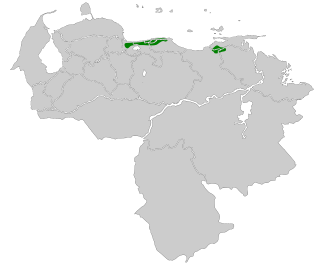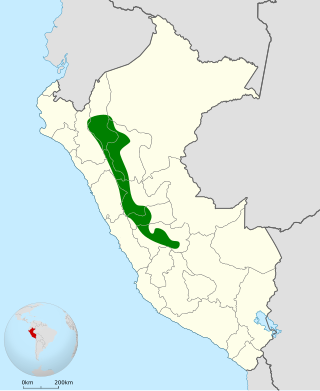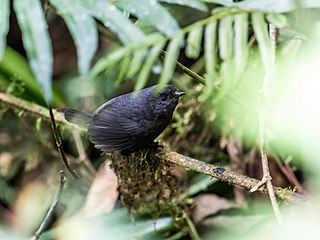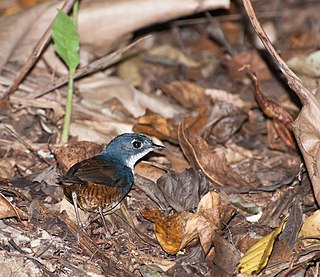
Scytalopus is a genus of small suboscine passerine birds belonging to the tapaculo family Rhinocryptidae. They are found in South and Central America from Tierra del Fuego to Costa Rica, but are absent from the Amazon Basin. They inhabit dense vegetation at or near ground-level and are mainly found in mountainous regions, particularly the Andes. They can be very difficult to see as they run through the undergrowth in a mouse-like fashion.

The white-crowned tapaculo is a species of bird in the family Rhinocryptidae. It is found in Bolivia, Colombia, Ecuador, Peru, and Venezuela.

The Bolivian tapaculo is a species of bird in the family Rhinocryptidae. It is found in Bolivia and Peru.

The Caracas tapaculo is a species of bird in the family Rhinocryptidae. It is endemic to Venezuela.

The Chocó tapaculo is a species of bird in the family Rhinocryptidae. It is found in Colombia, Ecuador, and Panama.

The rufous-vented tapaculo is a species of bird in the family Rhinocryptidae. It is endemic to Peru.

The pale-bellied tapaculo, also known as the matorral tapaculo or rufous-rumped tapaculo, is a species of bird in the family Rhinocryptidae. It is found in Colombia and Venezuela.

The white-breasted tapaculo is a species of bird in the family Rhinocryptidae. It is endemic to the Atlantic forest of southeastern Brazil.

The large-footed tapaculo is a species of bird in the family Rhinocryptidae. It is endemic to Peru.

The Mérida tapaculo is a species of bird in the family Rhinocryptidae. It is endemic to Venezuela.

The Brasília tapaculo is a species of bird in the family Rhinocryptidae. It is endemic to southern Brazil.

The trilling tapaculo is a species of bird in the family Rhinocryptidae. It is found in Bolivia and Peru.

The puna tapaculo is a species of bird in the family Rhinocryptidae. It is found in Bolivia and Peru.

Zimmer's tapaculo is a species of passerine bird in the family Rhinocryptidae. It is found in Bolivia and Argentina.

The Vilcabamba tapaculo is a small passerine bird in the family Rhinocryptidae. It is endemic to Peru.

Eleoscytalopus is a genus of tapaculos found in lowland Atlantic forest of eastern Brazil. Until recently, they were included in the genus Scytalopus, but the two species are actually closer to the bristlefronts. Unlike the members of the genus Scytalopus, the members of Eleoscytalopus have largely white underparts and bluish-grey upperparts. The voices of the members of the two genera also differ.

The Diamantina tapaculo is a species of bird in the family Rhinocryptidae. It is endemic to northeastern Brazil.

The white-winged tapaculo is a species of bird in the tapaculo family, Rhinocryptidae. It was described in 2020 by the American ornithologist Tom Schulenberg and his colleagues. It is known only from north-central Peru, where it inhabits wet shrub forest and montane forest. White-winged tapaculos are small and drab birds, being mostly gray in color with brownish, barred upperparts and tails, and a distinctive patch of white on the wing. Adults are 10–11 cm (3.9–4.3 in) long; males weigh 18.0–20.8 g (0.63–0.73 oz) and females weigh 16.5–18.0 g (0.58–0.63 oz). Despite their relatively distinctive appearance, their cryptic nature means that they are typically best identified by their vocalizations.

The Ampay tapaculo is a species of bird in the family Rhinocryptidae. It is endemic to Peru.

The Loja tapaculo is a species of bird in the family Rhinocryptidae that the South American Classification Committee of the American Ornithological Society (AOS) accepted as a new species in July 2020. It had been classified as a subspecies of paramo tapaculo. It is found in Ecuador and Peru.






















